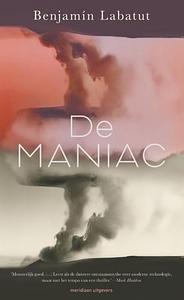Take a photo of a barcode or cover
informative
medium-paced
Plot or Character Driven:
Character
Strong character development:
Yes
Loveable characters:
Complicated
Diverse cast of characters:
No
Flaws of characters a main focus:
Yes
informative
reflective
medium-paced
Plot or Character Driven:
A mix
Strong character development:
No
Loveable characters:
No
Diverse cast of characters:
No
Flaws of characters a main focus:
Yes
informative
reflective
fast-paced
Plot or Character Driven:
A mix
Strong character development:
No
Loveable characters:
No
Diverse cast of characters:
No
Flaws of characters a main focus:
Complicated
Do believe the hype. Tan bueno como dicen. Me voy a comprar un tablero de go.
Don’t really know how to quantify what this book made me feel. Fantastic prose, making complicated things extremely readable, and also a human tragedy, and also a tech nightmare. I am glad that I finally read something that let me understand quantum physics (at an extremely basic level, but even this has evaded me for so long). But mainly I am terrified by the implications of the final third of this book. Read this, but maybe don’t read this?
se siente como leer Un verdor terrible, pero menos increíble.
challenging
informative
mysterious
fast-paced
Plot or Character Driven:
N/A
Genius and madness are separated by the finest of margins. Take logic past a certain point and it begins to resemble delusion. As the total sum of the world's intelligence becomes ever more concentrated in machines, what does this mean for humanity?
Just some of the depths plumbed in this remarkable book. Labatut has a knack with making scientists thrilling. I'd never have thought 'page-turner' could be used to describe a book centering around science, but here we are.
Jansci von Neumann's life not only intersected with some of the 20th century's pivotal movements (e.g. rise of Nazism) but he materially influenced them (e.g. development of the US's atom and H-bomb, electronic computation).
Our understanding of him is formed through hearing from those who knew him best. We never hear his own testimony, and the perspectives we do get are beautifully tendentious and partial.
Labatut bookends Jansci's life with two other lives no less compelling, who show the origins and outworking of his thought.
Each story is as compelling as the others.
Just some of the depths plumbed in this remarkable book. Labatut has a knack with making scientists thrilling. I'd never have thought 'page-turner' could be used to describe a book centering around science, but here we are.
Jansci von Neumann's life not only intersected with some of the 20th century's pivotal movements (e.g. rise of Nazism) but he materially influenced them (e.g. development of the US's atom and H-bomb, electronic computation).
Our understanding of him is formed through hearing from those who knew him best. We never hear his own testimony, and the perspectives we do get are beautifully tendentious and partial.
Labatut bookends Jansci's life with two other lives no less compelling, who show the origins and outworking of his thought.
Each story is as compelling as the others.
informative
medium-paced
A fascinating, interesting, and above all intriguing book about people I had barely heard of. Of course, the part about John von Neumann (1903-1957) is by far the most appealing. And that was also the reason why I read this book. I knew that the Hungarian-American mathematician Von Neumann was one of the founders of cybernetics, the study of very complex systems, but that is only addressed indirectly in this book. Labatut focuses on the unlikely genius that was von Neumann, his contribution to the development of the atomic and hydrogen bombs, and his steps towards artificial intelligence. In the form of docu-fiction, and via all kinds of people who knew him from close or further away, we get a kaleidoscopic portrait of an impressive, but enigmatic man. That formula has been cleverly applied, with of course also a lot of contradictory information and views. This is not a hagiography, because the view we get of the man von Neumann is not always flattering. Moreover, the very extensive von Neumann section is preceded by a short section on the Austrian physicist Paul Ehrenfest (1880-1931), and an extensive epilogue on the development of the first AI systems that defeated human grandmasters in both chess and go.
As said, all fascinating and interesting, but you are left with the question of where exactly Labatut was heading with this book: is it purely documentary (raising up a forgotten history)?, is it a warning against groundbreaking, but unstable geniuses? Or a warning against Artificial Intelligence itself? I am not sure. And I had a similar ambiguous feeling with his previous well-known work, ‘When we cease to understand the world’, which focused on the downside of great scientific inventions and insights. Perhaps this weakness is precisely its strength, and Labatut deliberately leaves room for the reader to develop his own interpretation.
Riveting. Like the quintillion+ lines of code/boundless algorithms of AlphaGo and AlphaZero, there is a lot to compute between the lines in this historical fiction/oral history novel.



